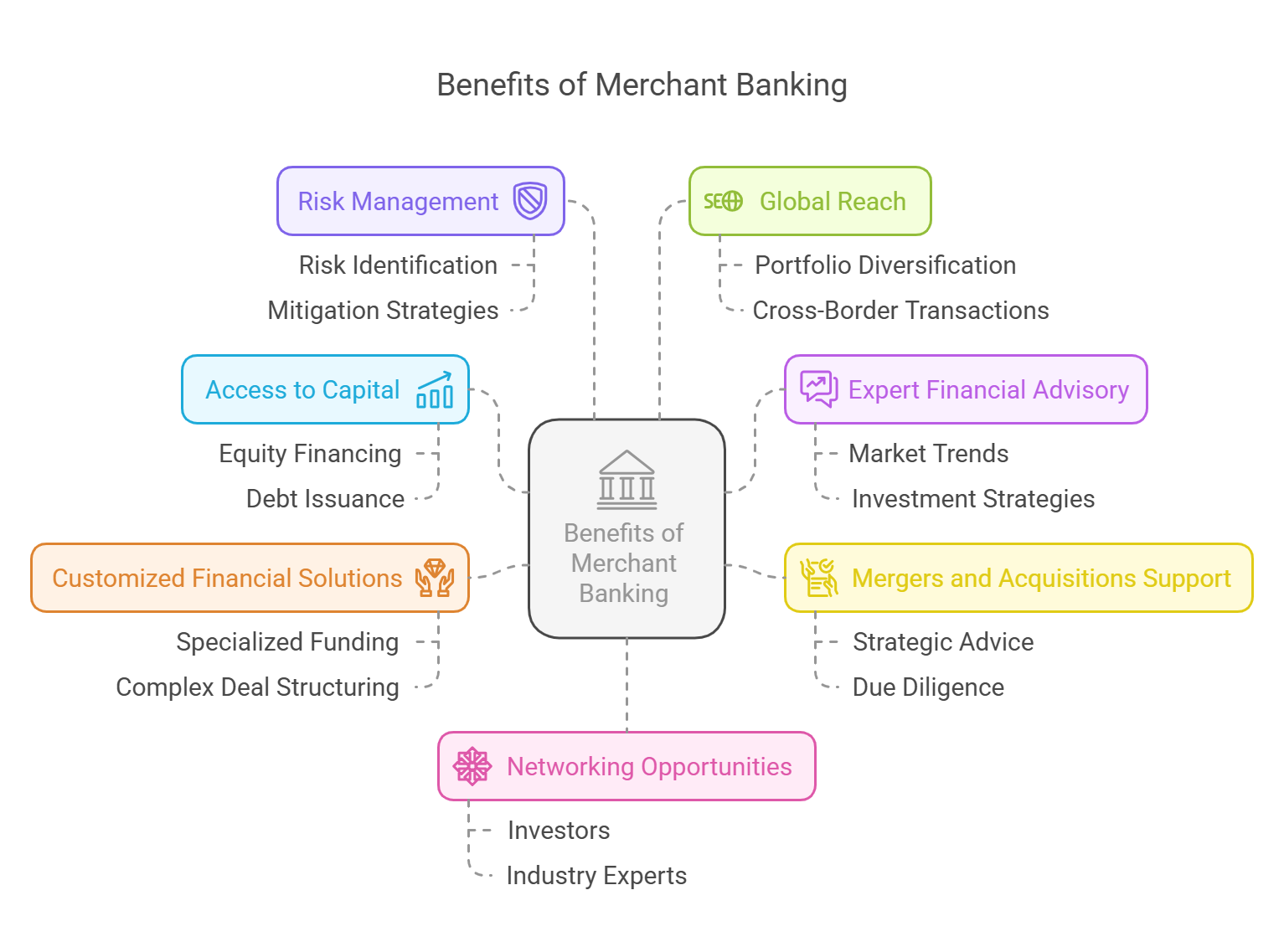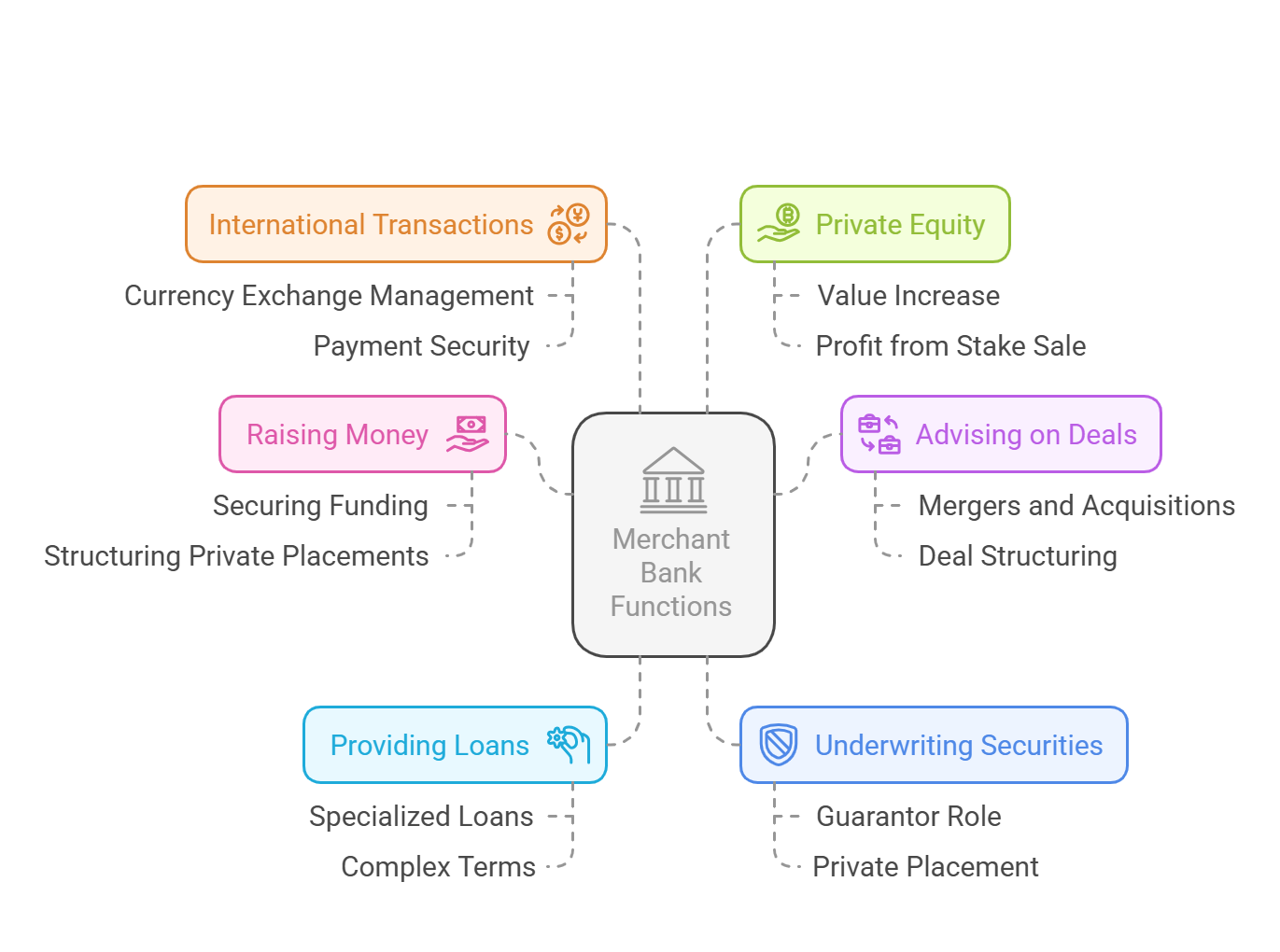Merchant Banks
Merchant banks are specialized financial institutions that focus on providing sophisticated financial services to large, privately-owned companies and high-net-worth individuals (HNWIs). They differ significantly from traditional retail banks.
1. What Merchant Banks Do (Functions)
Merchant banks offer a range of services, focusing on complex financial transactions rather than everyday banking needs. Here's a breakdown:
-
Raising Money (Fundraising):
- Helping private companies secure funding from sources other than public stock markets.
- This involves finding investors and structuring private placements.
-
Advising on Deals (Financial Advising):
- Guiding companies through mergers, acquisitions (M&A), and other strategic business decisions.
- Providing expertise in deal structuring, negotiation, and due diligence.
-
Providing Loans (Loan Services):
- Offering specialized loans tailored to the needs of large private corporations, particularly for international business ventures.
- These loans often involve complex terms and conditions.
-
Underwriting Securities (Underwriting):
- Acting as a guarantor and distributor for securities (like bonds or stocks) issued by private companies.
- Selling these securities to a select group of qualified investors (private placement).
- This helps companies raise capital without a public offering.
-
International Transactions:
- Facilitating complex financial transactions between companies located in different countries.
- Managing currency exchange risks and utilizing instruments like letters of credit to ensure payment security.
-
Private Equity:
- Directly investing in private companies with the goal of increasing their value over time.
- Later, selling their stake in the company for a profit. This is a riskier but potentially lucrative activity.
In simpler terms, merchant banks help private companies:
2. Who They Serve
Merchant banks primarily cater to the following clientele:
- Private Corporations: They are a crucial resource for businesses that are not publicly traded, providing them with the financial support they need to expand without resorting to the stock market.
- High-Net-Worth Individuals (HNWIs): Wealthy individuals who require sophisticated financial planning and investment services. This might include portfolio management, tax planning, and estate planning.
- Multinational Corporations: Companies with a significant presence in multiple countries, needing help with cross-border transactions and international financing.
3. How They're Different From Regular Banks
The key differences between merchant banks and traditional retail banks include:
- No Retail Banking: Merchant banks do not offer services like checking accounts, savings accounts, or mortgages to the general public.
- Focus on Private Companies: Unlike investment banks (which also work with public companies), merchant banks primarily work with private companies before they go public.
4. Merchant Banks vs. Investment Banks
While both types of banks provide financial services, their focus and clientele differ significantly:
| Feature | Merchant Bank | Investment Bank |
|---|---|---|
| Clients | Private companies (pre-IPO) | Public companies |
| Main Activity | Private placements | Initial Public Offerings (IPOs) |
| Income | Primarily fee-based | Fees & potential fund income |
Think of it this way:
- Investment banks help companies "go public" by selling stock to the general public through an IPO (Initial Public Offering).
- Merchant banks work with companies before they are ready for an IPO, assisting them in growing privately.
Example
Imagine a successful tech startup (Company A) wants to expand into Europe but doesn't want to go public yet. It hires a merchant bank. The merchant bank helps Company A:
- Find investors to fund the expansion.
- Advise on the legal and regulatory issues of doing business in Europe.
- Manage currency exchange risks.
businesses and boosting economic growth.
How Does Merchant Banking Work?
- Clientele: Serves large corporations, multinational companies, and high-net-worth individuals.
-
Core Activities:
- Underwriting securities for IPOs.
- Advising on mergers and acquisitions (M&A).
- Facilitating international trade and investments.
-
Revenue Models:
- Higher service fees due to specialised expertise.
- Equity stakes in client companies for potential long-term gains.
- Nature: Merchant banks operate as standalone entities or divisions of larger financial institutions like investment or commercial banks.
Benefits of Merchant Banking
- Risk Management: Hedging, derivatives, insurance.
- Specialised Knowledge: Market insight.
- Global Network: Access to investors and institutions.
- International Expertise: Helping clients into foreign markets.
- Customised Solutions: Solutions for individual clients.
-
Long term Relationships: Building relationships for ongoing advice.

Examples of Merchant Banking Activities
- Underwriting: Merchant banks manage the risk of IPOs by purchasing securities from issuers and selling them to investors.
- Mergers & Acquisitions: Acting as intermediaries ensures smooth deal structuring and negotiation.
- Private Equity: Investing in companies to improve operations and generate long-term returns.
- Venture Capital: Funding early-stage startups with high growth potential.
- Wealth Management: Catering to high-net-worth individuals with investment, tax, and estate planning.
- Corporate Finance: Offering debt/equity financing, restructuring, and risk management solutions.


No Comments